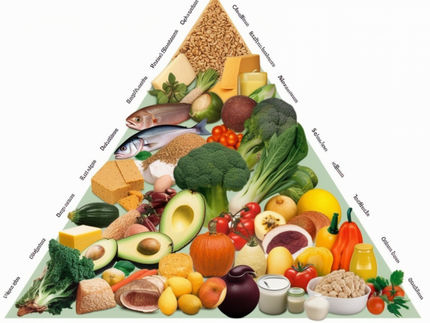Mediterranean diet may protect against memory loss and dementia
Alzheimer study of the DZNE
Advertisement
Alzheimer's dementia is caused by protein deposits in the brain and the rapid loss of brain matter. But a Mediterranean diet rich in fish, vegetables and olive oil may protect the brain from these disease triggers. That's what experts at the DZNE found in a recent study. The findings appeared in the May 05, 2021 online issue of Neurology®, the medical journal of the American Academy of Neurology.

Bild von Lukas Bieri auf Pixabay
Alzheimer's disease causes nerve cells in the brain to die. Largely responsible for the death of nerve cells are certain protein deposits in the brains of affected individuals: So-called beta-amyloid proteins, which form clumps (plaques) between nerve cells, and tau proteins, which stick together the inside of nerve cells. The causes of these deposits are as yet unclear. In addition, a rapidly progressive atrophy, i.e. a shrinking of the brain volume, can be observed in those affected. Alzheimer's symptoms such as memory loss, disorientation, restlessness and challenging behaviour are the consequences.
Scientists at the DZNE led by Prof. Michael Wagner, head of the research group at the DZNE and senior psychologist at the memory outpatient clinic of the University Hospital Bonn, have now found in a study that a more Mediterranean dietary pattern, with relatively higher consumption of vegetables, legumes, fruit, cereals, fish and monounsaturated fatty acids such as olive oil, may protect against protein deposits in the brain and brain atrophy. This diet, also called the "Mediterranean diet," has a low intake of dairy products, red meat and saturated fat.
Nationwide study
A total of 512 subjects with an average age of around seventy took part in the study. 169 of them were cognitively healthy, while 343 were identified as having a higher risk of developing Alzheimer's disease - due to mild subjective memory impairment, mild cognitive impairment that is the precursor to dementia, or first-degree relationship with patients diagnosed with Alzheimer's disease. The nutritional study was funded by the Competence Cluster Diet-Body-Brain of the Federal Ministry of Education and Research and took place within the framework of the so-called DELCODE study of the DZNE, which investigates the early phase of Alzheimer's disease nationwide - the period before pronounced symptoms appear.
"People in the second half of life have constant eating habits. We investigated whether the study participants regularly eat a Mediterranean diet - and whether this might have an impact on brain health ", says Prof. Wagner. The test persons first filled out a questionnaire in which they indicated which portions of 148 different foods they had eaten in the past months. Those who frequently ate healthy foods typical of the Mediterranean diet, such as fish, vegetables and fruit, and only occasionally consumed foods such as red meat, scored highly on a scale.
Extensive testing
The researchers then investigated all the participants to see if they had any brain atrophies by performing magnetic resonance imaging (MRI) brain scans to determine brain volume. In addition, all test subjects underwent various neuropsychological tests in which cognitive abilities such as memory functions were examined. In the so-called cerebrospinal fluid (CSF) of 226 subjects, the research team also looked for biomarkers (measured values) for amyloid beta proteins and tau proteins.
The researchers led by Michael Wagner found that those who ate an unhealthy diet had higher pathological levels of these biomarkers in the CSF than those who regularly ate the Mediterranean diet. In memory tests, the participants who did not adhere to the Mediterranean diet also performed worse than those who regularly had fish and vegetables on their plates. "There was also a significant positive association between a high score on the food scale for the Mediterranean diet pattern and a high volume of the hippocampus. The hippocampus is an area of the brain that is considered the control center of memory and shrinks early and severely in Alzheimer's disease," explains Dr. Tommaso Ballarini, a scientist in Michael Wagner's research group and lead author of the study.
Continuation of nutrition study planned
"So it may be that the Mediterranean diet protects the brain from protein deposits and brain atrophy that can cause memory loss and dementia. Our study provides evidence for this," says Ballarini. "However, future studies will have to show what biological mechanism is behind this." As a next step, Ballarini and Wagner now plan to reexamine the same study participants after four to five years to explore how diet - Mediterranean or unhealthy - affects brain aging over time.
Note: This article has been translated using a computer system without human intervention. LUMITOS offers these automatic translations to present a wider range of current news. Since this article has been translated with automatic translation, it is possible that it contains errors in vocabulary, syntax or grammar. The original article in German can be found here.






























































